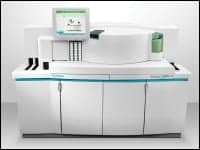Scientists at GE Global Research, Niskayuna, NY, the technology development arm of the General Electric Co, are working with a team based at the University of Washington to develop a new medical device, the size of deck of cards, that can detect infectious disease by way of a simple nasal swab, in less than an hour.
Click here to see a video simulation of how such a device could work and hear from GE’s lead researcher.
“We live in an on-demand world, where news and information is instantaneous. We’ve asked why the same can’t be done for diagnosing infectious diseases where early detection is so critical to positive patient outcomes,” says David Moore, manager of the Membrane and Separation Technologies Lab at GE Global Research and co-principal investigator on the project. “As part of our program with DARPA, we’re developing a small, lightweight device that a doctor could fit in their pocket. This unit could readily detect multiple pathogens in limited resource settings, such as military outposts or communities in remote areas.”
GE also envisions primary market opportunities in hospitals, clinics and physicians’ offices, where this device could be used to render point-of-care diagnosis.
GE is conducting the research jointly with a team led by Professor Paul Yager, PhD, chair of Bioengineering at the University of Washington, Seattle. “We’re very excited about this team’s unique ability to combine new designs for paper-based microfluidics with new nucleic amplification methods and GE’s novel paper chemistries to help develop the first fully-disposable versatile pathogen identification technology for use in the developed and developing worlds,” Yager says.
As part of this program, GE scientists will be developing next-generation paper and membrane materials, while also utilizing a suite of commercial papers and membranes, including Whatman FT.
The first disease researchers will target is methicillin-resistant Staphylococcus aureus, or MRSA, a drug-resistant bacterium responsible for hard-to treat infections.
In addition to MRSA, the device GE is researching would be built to quickly detect a broad range of pathogens, including sexually transmitted diseases (STDs) and various viral infections. ified, amplified, and detected,” Moore added.
[Source: GE]




